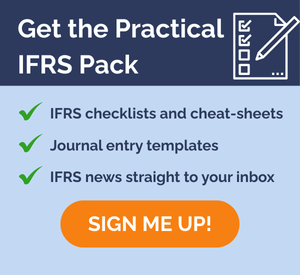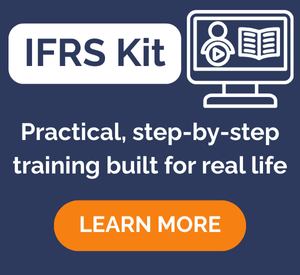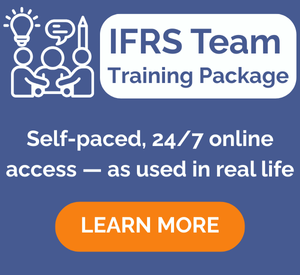IFRS S1: What, How, Where, How much it costs
so, what is IFRS S1 General Requirements for Disclosure of Sustainability-related Financial Information about?
As its title says, it is about the general requirements for disclosure of sustainability-related financial information.
As a result, you will not find any specific rules for the disclosures, because IFRS S1 serves as a framework for your reporting.
It is something like the equivalent of IAS 1, IAS 8 or Conceptual Framework in IFRS.
In other words, it is YOU (or the related company) who shall develop its own sustainability disclosures and IFRS S1 just gives you guidance for doing so.
Let me brief you a bit.
#1 Which information should you provide?
Not ALL possible.
That would be time and cost demanding, and not very useful.
Instead, you should provide only material information about sustainability-related risks and opportunities that can affect your (entity’s) cash flows, access to finance or cost of capital, etc.
Also, please note the focus on “material” – that is, the one that can affect the decisions of the users of your financial statements.
#2 Where should you report sustainability-related information?
Directly in the general-purpose financial reports, for example in the management commentary, annual reports, etc..
And, make it all connected to these financial statements. It means using the same assumptions and estimates, using the same presentation currency, providing the connections between the information on sustainability and financials, etc.
#3 So what’s the process?
The process of developing your IFRS S1 disclosures has two basic steps:
Step 1: Identify which risks and opportunities you will report on
Here, IFRS S1 does not tell you which specific risks and opportunities you need to report on.
Instead, it primarily refers you to SASB standards, but you can use the other guidance, too.
SASB standards are developed by The Sustainability Accounting Standards Board (hence the abbreviation SASB) and they are industry-specific.
Currently, there are 77 different SASB standards for 77 different industries, so what you need to do is to use the SASB standard applicable for your own industry.
For example, if you work for internet media&services organization, then you just apply the SASB standard for that industry.
You can download these standards from SASB website at no cost.
Step 2: Identify applicable disclosure requirements
Once you identified what you are going to report about, you need to identify what information you are going to provide about it.
Your information must be relevant, true and should include the disclosures about governance of that risk, the strategy used to manage risks and opportunities, risk management and different metrics and targets.
And then, of course, you need to gather the relevant data.
#4 How much will this cost us?
Of course, the total costs of gathering data in line with IFRS S1 will depend on the specifics of your company, but let me give you the estimate.
According estimates made by AI, companies with turnover of 20 million USD can expect to incur costs in the range of 10 000 to 100 000 USD annually, just to meet the requirements of IFRS S1.
Any questions or comments? Please let me know below, thank you!
Tags In
JOIN OUR FREE NEWSLETTER AND GET
report "Top 7 IFRS Mistakes" + free IFRS mini-course
Please check your inbox to confirm your subscription.
1 Comment
Leave a Reply Cancel reply
Recent Comments
- mahima on IAS 23 Borrowing Costs Explained (2025) + Free Checklist & Video
- Albert on Accounting for gain or loss on sale of shares classified at FVOCI
- Chris Kechagias on IFRS S1: What, How, Where, How much it costs
- atik on How to calculate deferred tax with step-by-step example (IAS 12)
- Stan on IFRS 9 Hedge accounting example: why and how to do it
Categories
- Accounting Policies and Estimates (14)
- Consolidation and Groups (25)
- Current Assets (21)
- Financial Instruments (56)
- Financial Statements (54)
- Foreign Currency (9)
- IFRS Videos (74)
- Insurance (3)
- Most popular (7)
- Non-current Assets (56)
- Other Topics (15)
- Provisions and Other Liabilities (46)
- Revenue Recognition (27)
- Uncategorized (1)





Hello,
This note is shared for governance-awareness only, following your recent article on IFRS S1.
Your explanation clearly outlines that IFRS S1 requires entities to determine what sustainability-related information is material and how it is disclosed within general-purpose financial reporting.
One point that is increasingly emerging in practice — and may be useful for readers — is that as IFRS S1 / S2 implementation matures, reviewers and assurance discussions are focusing not only on disclosure outputs, but also on how governance reasoning, sequencing and justification behind those disclosures is documented and explained over time.
In other words, IFRS S1 leaves methodology choice with the entity — but that choice itself can become examinable under assurance, audit and regulatory scrutiny.
This observation is shared purely as contextual awareness for readers, not as critique, recommendation or advocacy of any framework.
Thank you for your ongoing IFRS educational work.
Kind regards,
Chris Kechagias